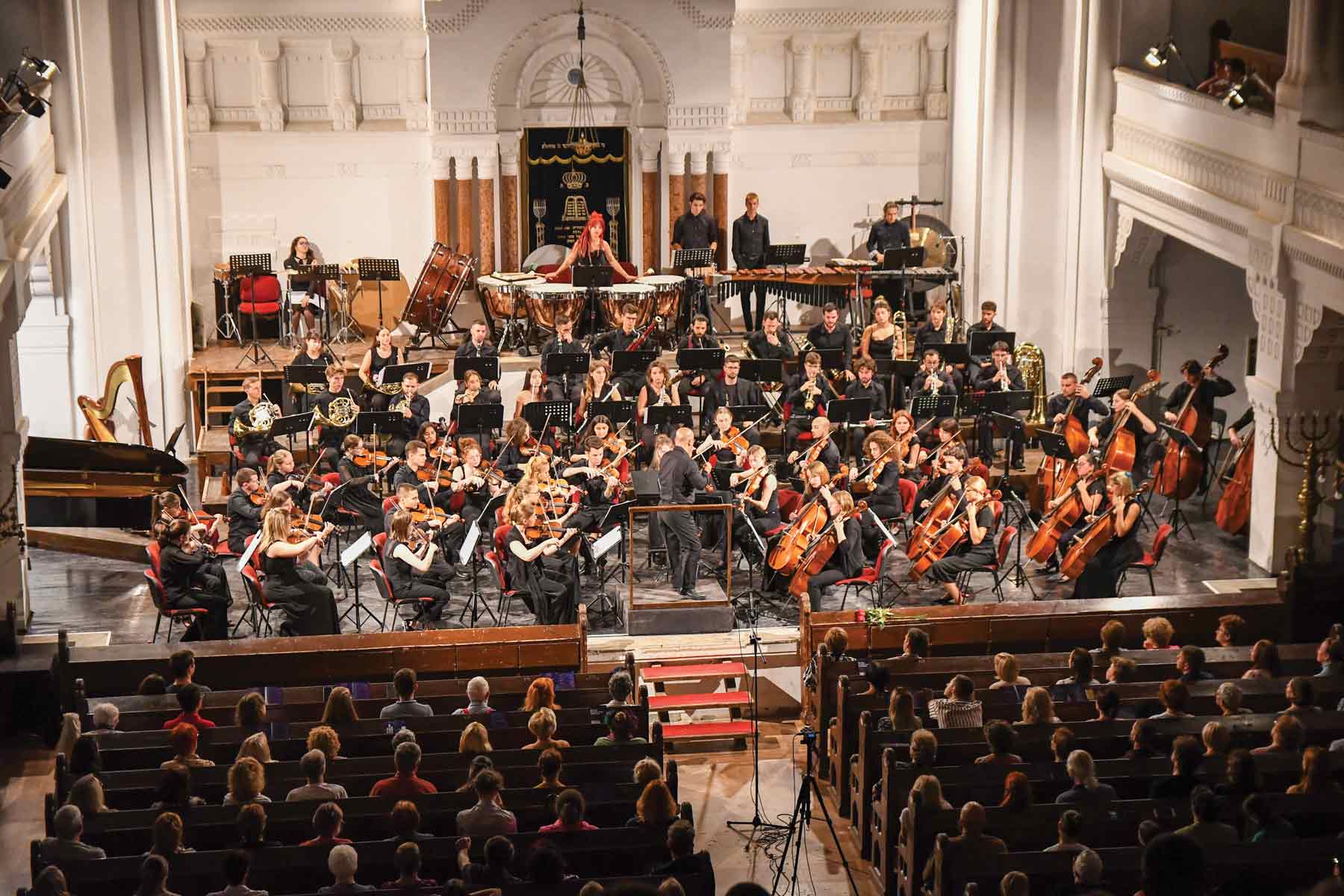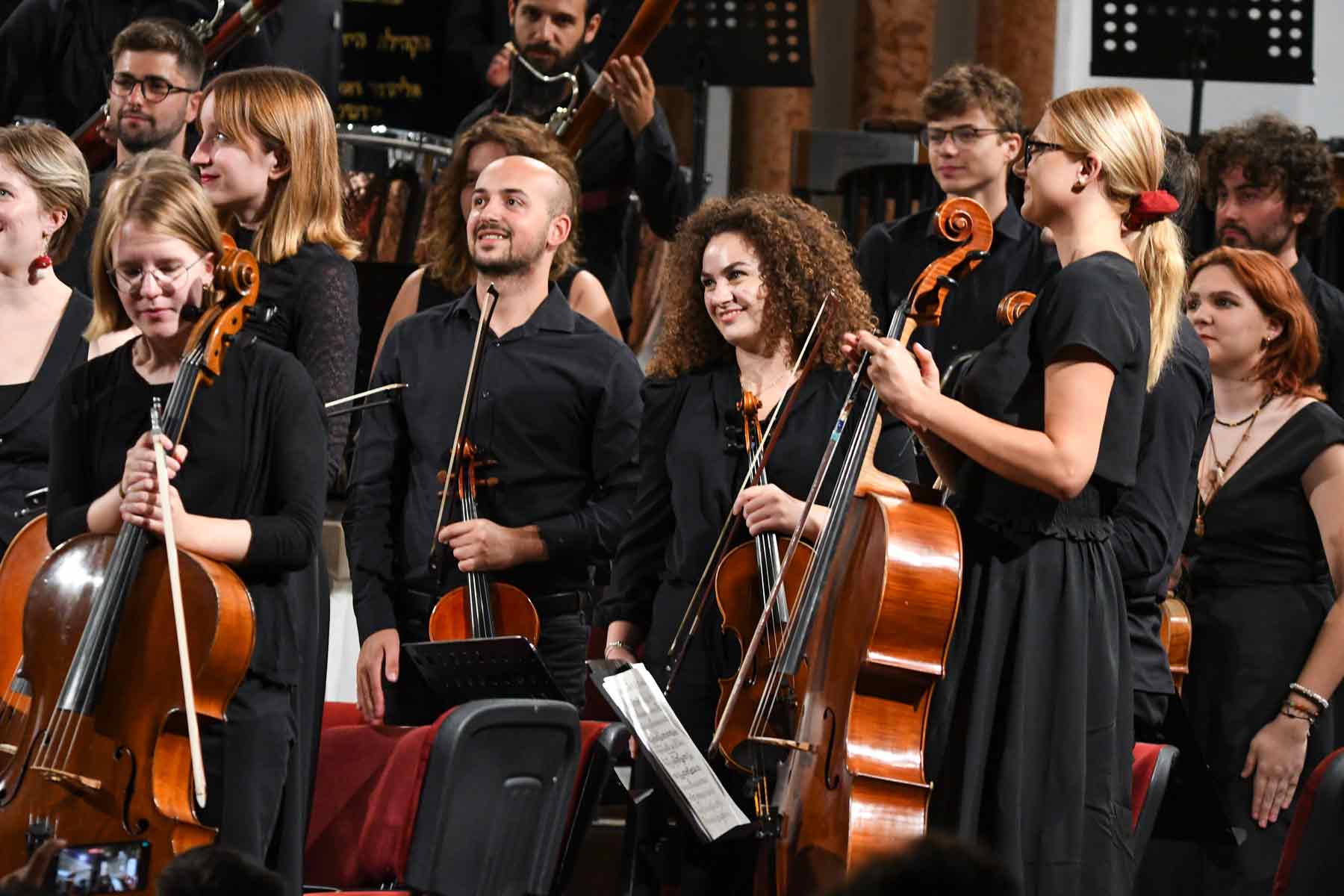When the Western Balkans Youth Orchestra performed in Serbia’s second-largest city, Novi Sad, in the summer of 2022, it almost did so without its Kosovar members.
The point of contention? The Serbian national anthem was part of the repertoire – a challenging situation considering that Kosovo and Serbia were on opposite sides of a 1998-99 war whose shockwaves can still be felt today. Serbia’s refusal to recognise Kosovo’s independence – declared in 2008 – is just one element contributing to the ongoing tensions.
“We had some tough conversations. The Kosovar musicians also had to deal with pressure from their friends and families at home,” says Desar Sulejmani, the Albanian-born, Berlin-based founder and conductor of the orchestra. “But in the end, after a lot of talking, we all played the anthem together.”
We’re showing that we can live and work together while preparing the young generation for a European future.
While the occurrence clearly shows the long shadow cast by of the region’s war-torn past, it also highlights the reconciliatory power of collaborating on a cultural project. “You can see it at the beginning of our residencies: they’re a bit hesitant, and stay in their language groups,” Sulejmani says. “The history is a part of them. But when you work together, the barriers fall automatically and friendships form.”
The Western Balkans Youth Orchestra is one of many cultural projects in the Balkans funded by the European Union, from supporting local film festivals to teaching older artisans how to sell their creations on Instagram. From 2014 to 2020, the EU invested, via its Creative Europe instrument alone, €85m in 230 projects throughout the Western Balkans region.
This is all part of a bigger strategy. Culture has become an essential component of EU foreign policy, in part through the European Commission’s European Neighbourhood Policy, which undergirds the bloc’s ties with 16 eastern and southern neighbours. And the acquis communautaire, the body of common rights and obligations that candidate countries have to adhere to in order to join the EU, also makes reference to culture.
 The Western Balkans Youth Orchestra in Novi Sad in 2023.
The Western Balkans Youth Orchestra in Novi Sad in 2023.
The approach is rooted in the idea that “cultural policies [are] drivers for peace and socio-economic development,” as outlined in a joint communication by the European Parliament and Council from 2016. The paper, widely seen as a landmark moment signifying a change of direction that champions a cooperative peer-to-peer learning approach, highlights that “inter-cultural dialogue can contribute to addressing major global challenges – such as conflict prevention and resolution, integrating refugees, countering violent extremism, and protecting cultural heritage.”
Walter Zampieri, the former head of the European Commission’s Cultural Policy Unit and a driving force behind the text, puts it this way: “We’re not helping the enlargement process through some sort of propaganda. We are helping people who, in the long term, can help us. In all societies, artists, writers, professors and intellectuals tend to be in favour of freedom of expression and artistic freedom. We give them the space and opportunities to do their job, without policing the content.”
It’s a bottom-up approach that avoids imposing values from above. “There are years and years of evidence and international research showing that participating in cultural activities can support social inclusion and strengthen democracy,” says Dr Mafalda Dâmaso, a researcher and expert in EU cultural policy.
The idea that cultural policies can have a significant impact on entire societies and countries is not new. At the end of the 1980s, political scientist Joseph Nye coined the term ‘soft power,’ referring to strategies resulting in a change of behaviour by attraction and persuasion rather than through coercion, competition or conflict – so-called hard power. “I don’t like that term. It sounds like we’re doing something with power in our mind,” says Zampieri.
This cultural relations model places equality at its centre and sees culture as a bridge builder.
Similarly, drawing a distinction between the foreign-policy approaches of the United States and the EU, Dâmaso argues that soft power is “associated with self-interest and maintaining power over others.” She adds: “This approach is not compatible with what the EU is doing in terms of culture, which is putting power-sharing and collaboration at the heart of its work.”
Helmut K Anheier, a professor of sociology at the Hertie School in Berlin who has extensively studied the impacts of different soft power policies, contends that they are most successful when used in a subtle way. “The key is to be in it for the long term,” he says. “And the closer cultural programmes are to politics or commercial interests, the less successful they’re going to be. You have to make sure they’re not overtly tied to external objectives.”
The Western Balkans Youth Orchestra, which recently opened up to non-Balkan musicians and now welcomes participants from 15 countries, is a prime example of that. “It’s about doing something together within Europe, being part of the family in that sense. This can have a big effect,” says Zampieri.
 The Western Balkans Youth Orchestra in Novi Sad in 2023
The Western Balkans Youth Orchestra in Novi Sad in 2023
No matter if it is playing music, painting a mural or writing a poem together – the important part is making things happen through collaboration, which builds trust and lasting relationships. “This cultural relations model places equality at its centre and sees culture as a bridge-builder, something that allows different parties to have a conversation and to learn from each other,” Dâmaso explains.
Of course, this approach has its limits. “It’s not a panacea,” she says. Zampieri agrees, adding: “Culture by itself cannot solve broader micro-challenges. Ideas are powerful. Culture may not be able to solve the war in Ukraine, but at the same time it can help Ukraine to be a more stable society.”
In the meantime, the Western Balkans Youth Orchestra is busy preparing its European concert tour this summer, which includes stops in Bosnia and Germany. Performances will also feature the Albanian, European and Kosovar anthems.
“We’re ahead of politics,” says Sulejmani. “By making music in this constellation – a political statement in itself – we’re showing that we can live and work together while preparing the young generation for a European future.”